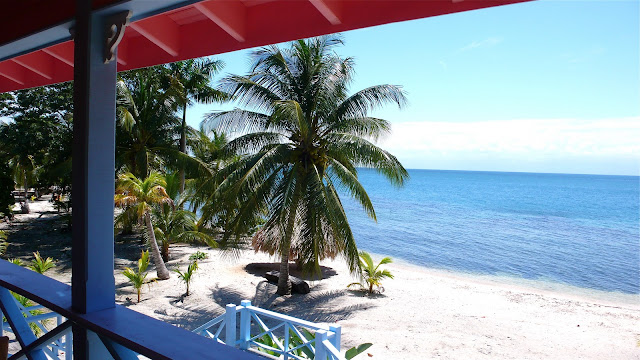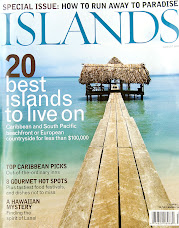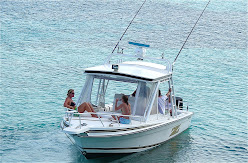Tropical storm Richard skirted by a few days ago and Utila is now the thick of rainy season. There has been rough seas and plenty of rain but when we get a break in the weather it's gorgeous!
Utila, Honduras... an expatriate paradise
Honduran island popular with divers lures some people who never leave
 Sunset over Utila, Honduras (Adam Laverty/Utila.com) |
UTILA, Honduras — The Honduras we think we know is a small Spanish-speaking country wedged somewhere between North and South America, between the First World amenities of its capital and the Third World poverty of its countryside, between an affordable cultural vacation destination and a risky stop in politically unstable terrain.
But there's a tiny piece of that country, not quite 25 square miles' worth, that is so rare and different that the few who have been there tend to want to stay forever — and many have.
Utila, the name of this remote island and its main town, is counted among the country's trio of Bay Islands but refuses to fit into the Honduran stereotype, if there is one. There are Spanish speakers, but there also are German, French and Norwegian speakers as well as variations of Garifuna and Carib and Creole-accented English that are neither here (New Orleans) nor there (Cayman Islands). It's easy to understand why "Utila" is pronounced differently depending on who is saying it. It's anchored in the Caribbean Sea by an ancient volcano that has since retired to a hill, yet it defies comparison to other Caribbean islands, including its Honduran neighbors, Roatan and Guanaja.
It's neither First World nor Third World; it's simply otherworldly, secure and peaceful.
Before a weeklong visit earlier this year, a friend residing there offered what I took to be a fantasy footnote.
"Utila is an island of pirates and runaways," she teased by e-mail. "Everyone is from somewhere else."
By the time my ferry pulled into the island's modest Municipal Dock on the late afternoon trip from the mainland, I realized she had been quite literal. The small welcome wagon included people of all shapes, sizes and colors.
Dogs barked at throttling motor scooters and whirring golf carts piled with groceries, construction tools and children, all dangerously vying for space on the alley-wide roads. As on most small islands, the ferry landings on Utila dictate rush hour, and I was in the thick of it.
Then, after everyone had kissed their hellos and made their way toward one of the three main roads branching out from the dock, traffic cleared and the pace slowed. For good.
Slow is a way of life on Utila. Despite the aforementioned scooter and golf-cart traffic, which has increased only in the last few years, walking is feasible almost everywhere one would want to wander. Pending weather, two daily ferries and endless scuba dives are scheduled, but everything else is relative. There are few clocks, fewer wristwatches. There is the sun, there is the moon. There are roosters, there are discotheques. And like clockwork, these elements dictate the waking and sleeping hours of the island.
One doesn't go to Utila to make plans anyway. There are no resorts or hotels to speak of, and there was no tourism office that I found. It's not paradise, but it's beautiful, in a decrepit sort of way. Unlike Roatan, whose population of 30,000 seems enormous compared with humble Utila's 7,000 or so residents, Utila seems to get by on charm alone. There are tourists, but most of them are scuba-obsessed backpackers in search of some of the cheapest Professional Association of Diving Instructors certifications in the world. They rent rooms by the night from dive shops and buy their breakfast at Bush's Supermarket instead of loitering with the locals at the Munchies restaurant. Most of Utila's visitors stay for a few days, a week or, if they're lucky, a month, and then move on.
Unless, of course, they don't.
Ask residents how they came to live on Utila and always, without fail, "It's a long story."
Presuming she or he isn't a descendant of the Dutch, French or English pirates who came and went for a few hundred years between Columbus' arrival and Honduras' land treaty with Britain to take ownership of the island, it starts with a vacation. A few amazing dives later, a decision is made to postpone the return ticket, choosing instead to stick around to see what kind of life might be carved out of the brain coral and the clear green sea in which the whale shark, the largest fish on Earth, calls home.
Most Utilans are known by first name and nationality only: Jen the Canadian, John the Norwegian, Nicole the German, Clara the Czech, Gunter the Austrian.
Gunter is so tan and leathery he could pass as luggage. He free-dives (sans oxygen) every morning to 90 feet. On one occasion when our paths crossed, I asked him how long he can hold his breath. "Long enough to survive," he said, telling me about the "half-men" on the southwestern tip of the island, crippled by the bends.
Capt. Morgan's Dive Shop is run by Kevin from Louisiana, who, like everyone else on the island, wound up here more or less accidentally. One afternoon, I pressed him for details, and after two white lies, he shook off the tourism charm and spoke soberly.
"The real story comes down to two words: What if," he said, looking out the front door of the shop into the sea in the distance. "I never wanted to ask myself 'What if' later in life."
IF YOU GO
Getting there
About 18 miles north of the mainland, Utila is among Honduras' Bay Islands. There is a landing strip to receive flights from the Bay Islands, but unpredictable weather makes scheduling uncertain. Your best bet is to arrive via the Utila Princess passenger ferry, with twice-daily service to and from the mainland port of La Ceiba for 400 lempiras (about $21).
Honduras' major airports are Toncontin International Airport in Tegucigalpa (TGU) and the less expensive Ramon Villeda Morales International Airport in San Pedro Sula (SAP). Both serve major airlines via Atlanta, Houston and Miami; and affordable luxury bus service is available to and from La Ceiba.
Staying there
On Utila, modest, affordable accommodations and eateries abound, as well as dive shops and opportunities for scuba certification. Renting a bicycle or motor scooter is feasible, though most of the island's populated areas are accessible via long, slow walks.
Information
Visit Utila's official Web site, AboutUtila.com.
But there's a tiny piece of that country, not quite 25 square miles' worth, that is so rare and different that the few who have been there tend to want to stay forever — and many have.
Utila, the name of this remote island and its main town, is counted among the country's trio of Bay Islands but refuses to fit into the Honduran stereotype, if there is one. There are Spanish speakers, but there also are German, French and Norwegian speakers as well as variations of Garifuna and Carib and Creole-accented English that are neither here (New Orleans) nor there (Cayman Islands). It's easy to understand why "Utila" is pronounced differently depending on who is saying it. It's anchored in the Caribbean Sea by an ancient volcano that has since retired to a hill, yet it defies comparison to other Caribbean islands, including its Honduran neighbors, Roatan and Guanaja.
It's neither First World nor Third World; it's simply otherworldly, secure and peaceful.
Before a weeklong visit earlier this year, a friend residing there offered what I took to be a fantasy footnote.
"Utila is an island of pirates and runaways," she teased by e-mail. "Everyone is from somewhere else."
By the time my ferry pulled into the island's modest Municipal Dock on the late afternoon trip from the mainland, I realized she had been quite literal. The small welcome wagon included people of all shapes, sizes and colors.
Dogs barked at throttling motor scooters and whirring golf carts piled with groceries, construction tools and children, all dangerously vying for space on the alley-wide roads. As on most small islands, the ferry landings on Utila dictate rush hour, and I was in the thick of it.
Then, after everyone had kissed their hellos and made their way toward one of the three main roads branching out from the dock, traffic cleared and the pace slowed. For good.
Slow is a way of life on Utila. Despite the aforementioned scooter and golf-cart traffic, which has increased only in the last few years, walking is feasible almost everywhere one would want to wander. Pending weather, two daily ferries and endless scuba dives are scheduled, but everything else is relative. There are few clocks, fewer wristwatches. There is the sun, there is the moon. There are roosters, there are discotheques. And like clockwork, these elements dictate the waking and sleeping hours of the island.
One doesn't go to Utila to make plans anyway. There are no resorts or hotels to speak of, and there was no tourism office that I found. It's not paradise, but it's beautiful, in a decrepit sort of way. Unlike Roatan, whose population of 30,000 seems enormous compared with humble Utila's 7,000 or so residents, Utila seems to get by on charm alone. There are tourists, but most of them are scuba-obsessed backpackers in search of some of the cheapest Professional Association of Diving Instructors certifications in the world. They rent rooms by the night from dive shops and buy their breakfast at Bush's Supermarket instead of loitering with the locals at the Munchies restaurant. Most of Utila's visitors stay for a few days, a week or, if they're lucky, a month, and then move on.
Unless, of course, they don't.
Ask residents how they came to live on Utila and always, without fail, "It's a long story."
Presuming she or he isn't a descendant of the Dutch, French or English pirates who came and went for a few hundred years between Columbus' arrival and Honduras' land treaty with Britain to take ownership of the island, it starts with a vacation. A few amazing dives later, a decision is made to postpone the return ticket, choosing instead to stick around to see what kind of life might be carved out of the brain coral and the clear green sea in which the whale shark, the largest fish on Earth, calls home.
Most Utilans are known by first name and nationality only: Jen the Canadian, John the Norwegian, Nicole the German, Clara the Czech, Gunter the Austrian.
Gunter is so tan and leathery he could pass as luggage. He free-dives (sans oxygen) every morning to 90 feet. On one occasion when our paths crossed, I asked him how long he can hold his breath. "Long enough to survive," he said, telling me about the "half-men" on the southwestern tip of the island, crippled by the bends.
Capt. Morgan's Dive Shop is run by Kevin from Louisiana, who, like everyone else on the island, wound up here more or less accidentally. One afternoon, I pressed him for details, and after two white lies, he shook off the tourism charm and spoke soberly.
"The real story comes down to two words: What if," he said, looking out the front door of the shop into the sea in the distance. "I never wanted to ask myself 'What if' later in life."
IF YOU GO
Getting there
About 18 miles north of the mainland, Utila is among Honduras' Bay Islands. There is a landing strip to receive flights from the Bay Islands, but unpredictable weather makes scheduling uncertain. Your best bet is to arrive via the Utila Princess passenger ferry, with twice-daily service to and from the mainland port of La Ceiba for 400 lempiras (about $21).
Honduras' major airports are Toncontin International Airport in Tegucigalpa (TGU) and the less expensive Ramon Villeda Morales International Airport in San Pedro Sula (SAP). Both serve major airlines via Atlanta, Houston and Miami; and affordable luxury bus service is available to and from La Ceiba.
Staying there
On Utila, modest, affordable accommodations and eateries abound, as well as dive shops and opportunities for scuba certification. Renting a bicycle or motor scooter is feasible, though most of the island's populated areas are accessible via long, slow walks.
Information
Visit Utila's official Web site, AboutUtila.com.

















